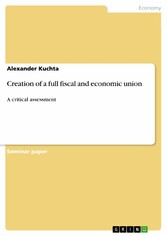Search and Find
Service
Creation of a full fiscal and economic union - A critical assessment
Seminar paper from the year 2013 in the subject Business economics - Economic Policy, grade: 2.0, University of Frankfurt (Main) (Applied Econometrics and International Economic Policy), course: Seminar: Towards a deep and genuine EMU: economic, financial and fiscal aspects, language: English, abstract: The sovereign debt crisis has kept the leaders of the European nations occupied with emer-gency sessions of the Euro group. The result of this often described 'muddling through' has led to what Angela Merkel called the 'union method': A polity approach of European inter-governmental cooperation that aims at strengthening the groundwork of the European mone-tary union (EMU), the rule-based Maastricht treaty. However, on their way to this new framework many sacred rules were sacrificed in order to prevent a collapse of the EMU due to its constructional flaws. But how exactly can one interpret the tight mesh of contracts that have been made by all parties? And what are the alternatives? What will be the impact? This seminar tries to deduct an answer to these questions by applying fiscal federalism theory to recent developments in Eurozone polity and will also attempt to employ the same criteria for a more Euro optimistic approach. The following seminar will address these questions and try to give a framework of the pros and contras of the given alternatives. The framework used will be the fiscal federalism theo-ry proposed by Oates. In the first part I will explain fiscal federalism and how an optimal level of centralisation and decentralisation can be derived. Furthermore I will explain how different preferences might affect this outcome. In the second part I will describe the short-comings in the construction of the Eurozone that lead to the unfortunate situation at hand and explain how externalities are created. The next step will be a distinction between a federa-tion and a confederation in order to explain on the basis of an example why the choice should be based on the preferences of voter in the country. Ultimately, I will discuss the ram-ifications of either choice on the Eurozone, how either choice can be implemented and which shortcomings are to be dealt with. In the end a short critical assessment of both choic-es will be given.
All prices incl. VAT














